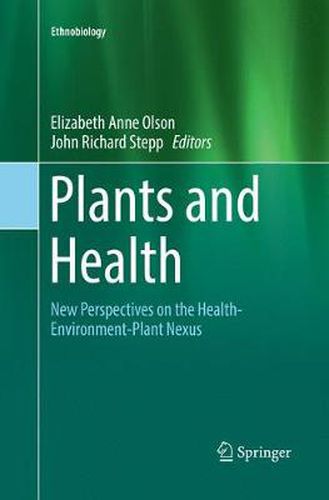Readings Newsletter
Become a Readings Member to make your shopping experience even easier.
Sign in or sign up for free!
You’re not far away from qualifying for FREE standard shipping within Australia
You’ve qualified for FREE standard shipping within Australia
The cart is loading…






This title is printed to order. This book may have been self-published. If so, we cannot guarantee the quality of the content. In the main most books will have gone through the editing process however some may not. We therefore suggest that you be aware of this before ordering this book. If in doubt check either the author or publisher’s details as we are unable to accept any returns unless they are faulty. Please contact us if you have any questions.
This volume showcases current ethnobiological accounts of the ways that people use plants to promote human health and well-being. The goal in this volume is to highlight some contemporary examples of how plants are central to various aspects of healthy environments and healthy minds and bodies. Authors employ diverse analytic frameworks, including: interpretive and constructivist, cognitive, political-ecological, systems theory, phenomenological, and critical studies of the relationship between humans, plants and the environment. The case studies represent a wide geographical range and explore the diversity in the health appeals of plants and herbs. The volume begins by considering how plants may intrinsically be ‘healthful’ and the notion that ecosystem health may be a literal concept used in contemporary efforts to increase awareness of environmental degradation. The book continues with the exploration of the ways in which medically-pluralistic societies demonstrate the entanglements between the environment, the state and its citizens. Profit driven models for the extraction and production of medicinal plant products are explored in terms of health equity and sovereignty. Some of the chapters in this volume work to explore medicinal plant knowledge and the globalization of medicinal plant knowledge. The translocal and global networks of medicinal plant knowledge are pivotal to productions of medicinal and herbal plant remedies that are used by people in all variety of societies and cultural groups. Humans produce health through various means and interact with our environments, especially plants, in order to promote health.
The ethnographic accounts of people, plants, and health in this volume will be of interest to the fields of anthropology, biology and ethnobiology, as well as allied disciplines.
$9.00 standard shipping within Australia
FREE standard shipping within Australia for orders over $100.00
Express & International shipping calculated at checkout
This title is printed to order. This book may have been self-published. If so, we cannot guarantee the quality of the content. In the main most books will have gone through the editing process however some may not. We therefore suggest that you be aware of this before ordering this book. If in doubt check either the author or publisher’s details as we are unable to accept any returns unless they are faulty. Please contact us if you have any questions.
This volume showcases current ethnobiological accounts of the ways that people use plants to promote human health and well-being. The goal in this volume is to highlight some contemporary examples of how plants are central to various aspects of healthy environments and healthy minds and bodies. Authors employ diverse analytic frameworks, including: interpretive and constructivist, cognitive, political-ecological, systems theory, phenomenological, and critical studies of the relationship between humans, plants and the environment. The case studies represent a wide geographical range and explore the diversity in the health appeals of plants and herbs. The volume begins by considering how plants may intrinsically be ‘healthful’ and the notion that ecosystem health may be a literal concept used in contemporary efforts to increase awareness of environmental degradation. The book continues with the exploration of the ways in which medically-pluralistic societies demonstrate the entanglements between the environment, the state and its citizens. Profit driven models for the extraction and production of medicinal plant products are explored in terms of health equity and sovereignty. Some of the chapters in this volume work to explore medicinal plant knowledge and the globalization of medicinal plant knowledge. The translocal and global networks of medicinal plant knowledge are pivotal to productions of medicinal and herbal plant remedies that are used by people in all variety of societies and cultural groups. Humans produce health through various means and interact with our environments, especially plants, in order to promote health.
The ethnographic accounts of people, plants, and health in this volume will be of interest to the fields of anthropology, biology and ethnobiology, as well as allied disciplines.